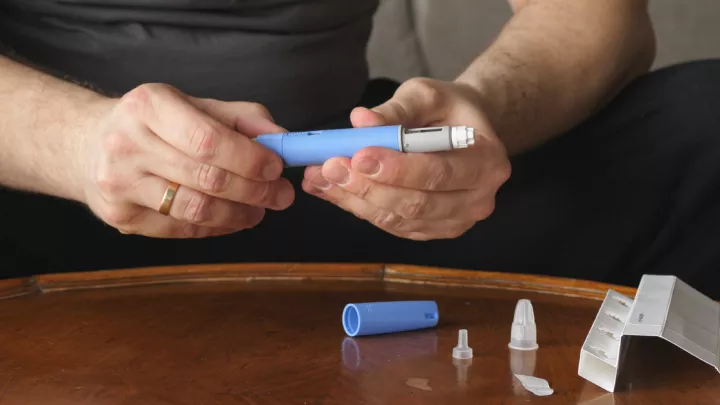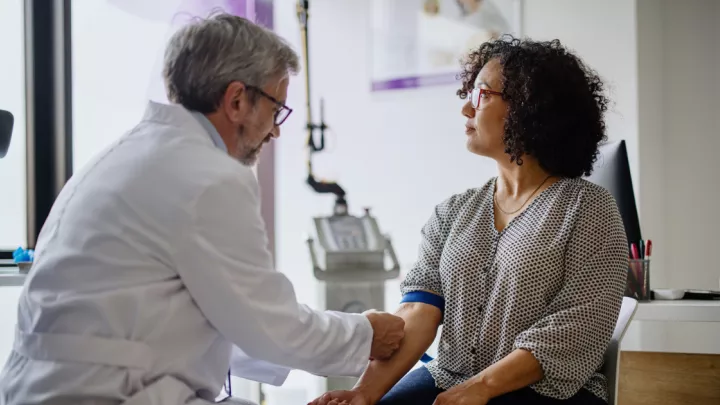You asked, we answered: How do you diagnose and manage adult ADHD?

Question:
Do you do ADHD testing for adults?
Answer by Priya Gearin, MD, child and adolescent psychiatrist:
When you think about attention deficit hyperactive disorder, hyperactive kids who can’t focus or pay attention may come to mind. However, most children do not grow out of ADHD and continue to live with its symptoms into adulthood, says Dr. Gearin.
Experts believe that only 1 in 10 children outgrow ADHD, says Dr. Gearin. According to the National Institute of Mental Health, 4.4% of adults have ADHD, but less than 20% get diagnosed or treated for it.
Untreated ADHD can cause problems in your daily life, affecting not only work and school but also relationships and social functioning, Dr. Gearin says.
ADHD is a neurodevelopmental disorder that is present in childhood before age 12. Some of the most common symptoms include:
- Trouble paying attention.
- Getting distracted easily.
- Impulsivity
- Hyperactivity
- Difficulty with organization and prioritizing tasks.
- Problems focusing on a task and completing it.
- Poor time management skills.
- Becoming frustrated easily.
While hyperactivity tends to dissipate as you get older, other symptoms, such as impulsivity, disorganization, poor management skills and difficulty completing tasks, may persist as an adult. Adults with ADHD also tend to experience more emotional dysfunction than adults without ADHD. They often have difficulty sleeping because they can’t shut down their minds at night.
Even more concerning, ADHD may reduce life expectancy by 6.5 years for those who had it as a child and more than 11 years for those who continue to deal with it into adulthood.
Adults with untreated ADHD are at greater risk for accidents and accidental death due to an inability to focus and stay attentive. It can also affect their ability to manage chronic health conditions properly. The development of anxiety and depression due to difficulties at work or home can lead to the use of harmful coping mechanisms such as alcohol, smoking or other substance abuse.
Risk factors for ADHD include:
- If a parent has ADHD, you have a 2 to 8 times greater chance of having ADHD.
- Prenatal exposure to substance abuse
- Prematurity
- Environmental exposure to lead
Diagnosing ADHD
Diagnosing adult ADHD can be easy to miss because your doctor is probably not looking for it. Diagnosis can also be more difficult because there is no definitive screening.
An evaluation starts with a physical exam to rule out other possible causes for your symptoms. A medical history interview will then be conducted to document your current and past symptoms. You and possibly a close family member or friend will be asked to complete a questionnaire to get more information about your symptoms.
Your doctor will be looking for specific inattention and hyperactivity/impulsivity symptoms common with ADHD. To be diagnosed as an adult, you must have experienced at least five of these symptoms, and they must have been present before age 12.
In addition, these symptoms must be present in two or more settings, such as school, work or home, notes Dr. Gearin. There also must be clear evidence that the symptoms interfere with or reduce quality of life and academic or occupational functioning. These symptoms include:
Inattention symptoms:
- Lack of attention to detail.
- Difficulty sustaining attention.
- Inattentiveness during conversations.
- Difficulty completing tasks and/or following instructions.
- Difficulty organizing tasks.
- Avoids activities that require sustained mental effort.
- Loses things necessary for completing tasks.
- Easily distracted by extraneous stimuli.
- Forgets to complete daily activities.
Hyperactivity and impulsivity symptoms:
- Fidgety
- Leaving their seat in situations where being seated is expected.
- Restlessness
- Inability to engage in leisure activities quietly.
- Inability to stay still for an extended time.
- Talking excessively.
- Interrupting conversations
- Difficulty waiting their turn.
- Finishes others’ sentences.
Treatment
Treatment for ADHD may entail a combination of medications, psychological counseling, education and skills training. Stimulant medications can be up to 80% effective and focus on the frontal lobe of the brain that produces dopamine. Dopamine is one of your brain’s primary neurotransmitters that help regulate impulse control, attention, focus, pleasure and reward activities.
“People with ADHD have difficulty dealing with stimuli,” says Dr. Gearin. “These medications help the brain focus.”
Medications used for ADHD fall into two categories – stimulants and nonstimulants. Stimulants work quickly and help people control their ADHD. Nonstimulants may take up to a month to work and can be a good choice for people who also have substance use disorders or side effects from stimulants.
“There are many different types of these medications, and they can be adjusted to fit each person’s needs,” says Dr. Gearin. “While ADHD can’t be cured, it can be managed effectively with the right treatment.”
To schedule an appointment with one of our psychiatrists, call 800.922.0000.
Please call campus Counseling and Psychological Services (CAPS) at 402.472.7450 to schedule an appointment and begin the evaluation process.







